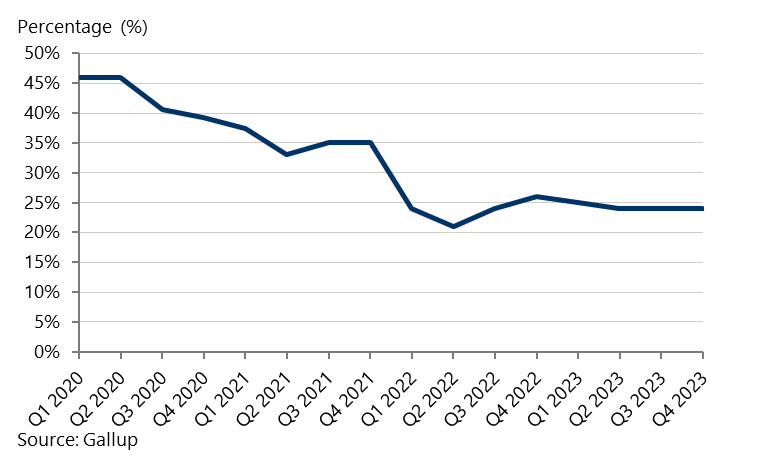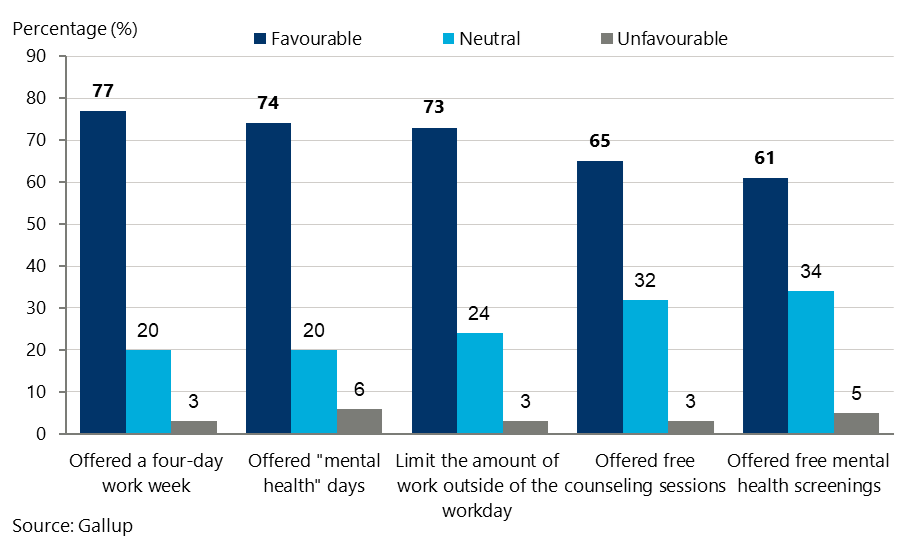Blog | 09 May 2024
Why companies should prioritise their employees’ wellbeing

Jai Patel
Economist

Employment is a fundamental part of life for many and directly links to their overall feelings of satisfaction and happiness. Recent studies, such as the comprehensive research conducted by the International Labour Organization (ILO), consistently highlight the positive association between employment and subjective wellbeing—the latter being how people evaluate their own lives. Across diverse demographics and geographic regions, individuals in employment consistently report higher levels of life satisfaction compared to their unemployed counterparts, highlighting the significance of meaningful work in enriching lives.
It is therefore incumbent on companies to ensure they support their employees’ satisfaction levels. One useful metric is subjective wellbeing, which measures how content we are as individuals, as a community, and as a nation. Coupled with traditional economic indicators, it allows us to gain a holistic understanding of wellbeing – and can send a signal about the need for action where subjective wellbeing in employment is low. The latest ONS Measuring progress, well-being and beyond GDP in the UK release—published on 9 May—shows that more than three in 10 adults in Great Britain are not satisfied with their job and nearly 40% of adults reported feeling unsatisfied with how they spend their time during the week. Additionally, in the US, only 1 in 4 workers strongly agree that their organisation cares about their wellbeing. Given such bleak results, now is a good time for companies to support the wellbeing of their workers.

The first part of this is understanding the impact of the workplace, as the quality of employment influences subjective wellbeing outcomes. Beyond having a job, factors such as work-life balance and opportunities for growth play pivotal roles in shaping employees’ sense of wellbeing. Research indicates that individuals working in non-conducive work environments tend to experience lower levels of wellbeing, highlighting the need for wellbeing initiatives in the workplace.
To further this, the benefits of employment extend beyond individual wellbeing to societal welfare. Not only does employment foster economic stability and social cohesion but it also contributes to community resilience. By promoting inclusive labour markets and offering diverse employment opportunities, businesses can play a pivotal role in promoting collective wellbeing and addressing socioeconomic disparities.
Yet, improving employee wellbeing goes beyond just satisfying employees themselves. It is in the company’s best interests to prioritise staff wellbeing if they want to keep employees engaged and productive and help them achieve long-term business progress. Globally, US$322 billion of turnover is lost due to employee burnout, stressing the importance of a supportive work culture. What is more, a recent study found that the top 25% of brands with the highest employee engagement scores experienced higher profit margins by 4% than those in the bottom 25%. Companies can go about rectifying the situation by different means. Three-quarters of employees in one survey welcome being offered mental health days or a four-day work week.

Overall, it is clear the employment companies provide emerge as a central determinant of national wellbeing. Research consistently indicates that employment plays a significant role in affecting health (evidenced by factors such as access to healthcare insurance), pension contributions, and the opportunity for skill development, among others. By prioritising policies and practices that are favoured by employees, businesses can chart a course towards a happier, more fulfilled, and resilient society.
Author

Jai Patel
Economist

Jai Patel
Economist
London, United Kingdom
Jai joined Oxford Economics in 2023 as a graduate in the London office.
Since joining, he has been involved in a variety of bespoke consultancy projects and has produced and supported Economic Impact reports. Such reports include an analysis of the impact of the accountancy profession to the UK economy and an assessment of the impact of lending to UK SMEs through a commercial banking company.
Jai holds a BSc in Economics from the London School of Economics and Political Science. While completing his studies, he undertook an internship at Ernst & Young.
Tags:
You may be interested in

Post
The Socioeconomic Impacts of Amazon Investments on local communities
New research from Oxford Economics finds that the opening of Amazon fulfillment centers lifts up local communities by increasing economic vitality while reducing hardship
Find Out More
Post
The Socioeconomic Impacts of Employer Investments on Local Communities
A groundbreaking research program that is designed to shed new light on the topic of the socioeconomic impact of large employers entering a local community.
Find Out More
Post
The British Gas Energy Trust: Alleviating the impact of fuel poverty
Oxford Economics were commissioned by British Gas to undertake a social return on investment analysis of the British Gas Energy Trust, a charity which funds interventions to alleviate the detrimental impact of fuel poverty.
Find Out More
Post
International Women’s Day: progress of the gender pay gap in the UK
The gender pay gap in the UK has been gaining publicity in recent years, but progress to reduce it has been slow. For full-time employees, there has been a narrowing in median gross hourly earnings between men and women by 2.3 percentage points since 2013 and at the current rate of change, the gap won’t close until 2051.
Find Out More